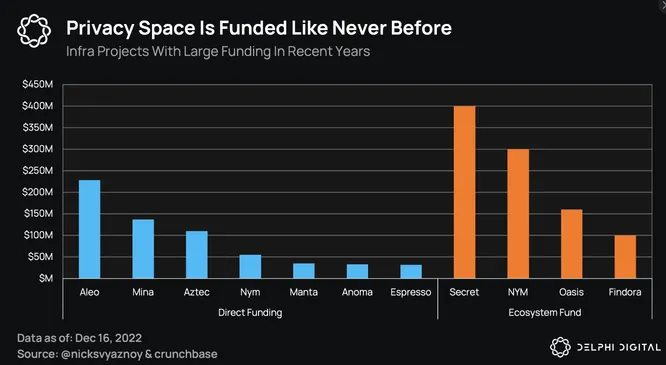Funding in crypto over the years has also led to research in fields like Zero Knowledge and other privacy-based technologies like MPC (Multi-Party Computation) and FHE (Fully Homomorphic Encryption). Historically, research in these fields had mainly been funded by 3 letter agencies like the NSA.

Governments and regulators don’t welcome the concept of cryptocurrencies with open arms, even though most transactions and wallet details are readily available for them to audit, albeit, pseudonymously for the most part. It is not a shocker when privacy-preserving chains and cryptos such as Zcash and Monero are banned from being traded. Monero and Zcash have had legal issues in certain geographies like South Korea, Australia, Japan, and even Dubai more recently. They were made unavailable on exchanges due to money laundering concerns.
Developer safety is a major concern for teams working on privacy-based protocols within and outside of the US. Decentralized front-ends or domain names could be set up with the help of Arveave or Filecoin and ENS but developers of privacy protocols would need to continue maintaining high levels of anonymity even within their close circles of communities and investors. Whistle-blowing is becoming a thing in crypto. In 2023, the CFTC paid out $16M in rewards to people who provided information related to crypto voluntarily. While these rewards mostly pertain to information on withdrawal scams, and pumps and dumps, I believe regulatory agencies would also take an interest in doxing anonymous teams of certain privacy-related protocols as seen in the case of Tornado Cash founders and developers.
On the other hand, a good portion of privacy defi protocols like Renegade, Panther, and Portal Gate, are readily willing to be compliant with the use of ZK Proofs for KYC/B. Developments like Proof of Innocence, which allow users to prove that their funds were not mixed with a certain set of funds within a privacy pool are also taking place. KYC/B can be a slippery slope. The more a protocol reveals, the more a regulatory would demand. There’s no saying that any of these ZK compliance measures will be accepted by regulators, at least not yet. PSE (Privacy Scaling and Explorations) is working on an application that helps Indian citizens anonymously verify their citizenship with Anon Aadhaar. Earlier in 2023, the EU recognized the use of ZK proofs for privacy-preserving IDs. Although this is not full-fledged acceptance, it is a good step forward. It will be quite interesting to see how things play out as we’ll probably be having more privacy-focused chains such as Aleo, Penumbra, and Namada launching next year and Aztec working on its privacy-focused ZK L2.